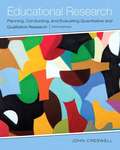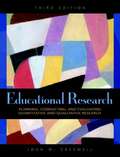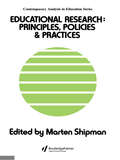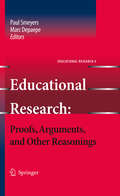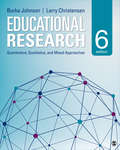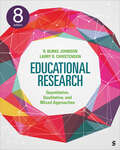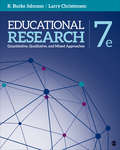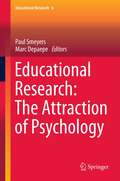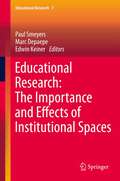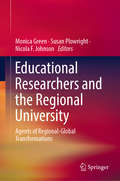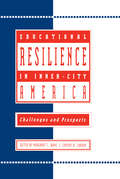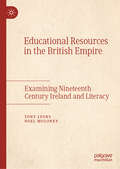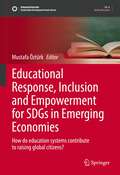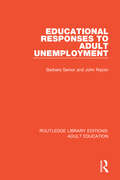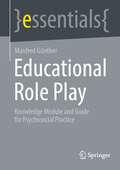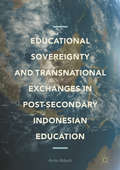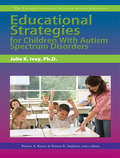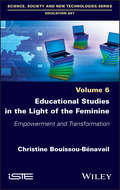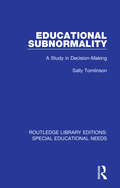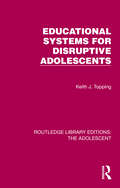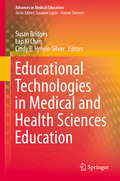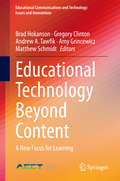- Table View
- List View
Educational Research: Planning, Conducting, and Evaluating Quantitative and Qualitative Research
by John W. CreswellEducational Research: Planning, Conducting, and Evaluating Quantitative and Qualitative Research offers a truly balanced, inclusive, and integrated overview of the field as it currently stands. This text provides thorough coverage of the methods and procedures used in quantitative, qualitative, and mixed-methods research. It helps students learn how to begin to conduct research and see a project through preparation of a manuscript, and it also helps students learn how to read and evaluate research reports.
Educational Research: Planning, Conducting, and Evaluating Quantitative and Qualitative Research (3rd edition)
by John W. CreswellThis book is appropriate for courses in Introduction to Educational Research. This successful core research text is known for its truly balanced coverage of qualitative and quantitative methods and the author's high-quality writing has made this book a favorite amongst instructors and students. In clear step-by-step language the text helps students learn how to read and evaluate research studies. Key changes include: updated quantitative coverage, expanded coverage of ethics, and new research articles. For future teachers.
Educational Research: Principles, Policies And Practices
by Marten ShipmanFirst Published in 1985. Routledge is an imprint of Taylor & Francis, an informa company.
Educational Research: Proofs, Arguments, and Other Reasonings
by Paul Smeyers Marc DepaepeThis book focuses on the language of educational research as well as on the language of education. It conceives both as social practices and investigates how rhetoric plays a part in the complex process of historically situated argumentation. The book aims to answer such questions as: 'What is the nature of the arguments and the kinds of sources one relies on?' and 'What kind of reasoning is offered to convince practitioners?' Taking postmodern criticism seriously, the contributors argue that the scholar or researcher cannot indulge in relativism or be satisfied with a description of particular cases. Instead, theoreticians as well as practitioners have to engage in sound thinking and dialogue. The chapters in this volume highlight relevant characteristics of the language of educational research. In addition, attention is paid to the language of particular debates which figure prominently in the wider educational context, such as the language of goals, of parenting, citizenship and capability.
Educational Research: Quantitative, Qualitative, and Mixed Approaches
by Larry B. Christensen R. Burke JohnsonAssuming no prior knowledge, Educational Research by R. Burke Johnson and Larry Christensen offers a comprehensive, easily digestible introductory research methods text for undergraduate and graduate students. Readers will develop an understanding of the multiple research methods and strategies used in education and related fields; how to read and critically evaluate published research; and the ability to write a proposal, construct a questionnaire, and conduct an empirical research study on their own. Students rave about the clarity of this best seller and its usefulness for their studies, enabling them to become critical consumers and users of research.
Educational Research: Quantitative, Qualitative, and Mixed Approaches
by Larry B. Christensen R. Burke JohnsonAssuming no prior knowledge, Educational Research by R. Burke Johnson and Larry Christensen offers a comprehensive, easily digestible introductory research methods text for undergraduate and graduate students. Readers will develop an understanding of the multiple research methods and strategies used in education and related fields; how to read and critically evaluate published research; and the ability to write a proposal, construct a questionnaire, and conduct an empirical research study on their own. Students rave about the clarity of this best seller and its usefulness for their studies, enabling them to become critical consumers and users of research.
Educational Research: Quantitative, Qualitative, and Mixed Approaches
by Robert Burke Johnson Larry B. ChristensenEducational Research: Quantitative, Qualitative, and Mixed Approaches by R. Burke Johnson and Larry Christensen offers a comprehensive, accessible introduction to research methods for undergraduate and graduate students. Readers will develop an understanding of the multiple research methods and strategies used in education and related fields, including how to read and critically evaluate published research and how to write a proposal, construct a questionnaire, and conduct an empirical research study on their own. The Eighth Edition maintains the features that made this book a best-seller, including attention-grabbing chapter-opening vignettes, lively examples that engage student interest, a conversational and friendly writing style, and more. Fully updated for the Seventh Edition of the Publication Manual of the American Psychological Association, this new edition includes expanded information on research ethics and IRBs, expanded and more current information on sampling and causation across research designs, and the latest thinking on mixed methods research. Designed to make learning about research methods enjoyable without sacrificing the necessary rigor, this highly readable text transforms readers into critical consumers and users of research.
Educational Research: Quantitative, Qualitative, and Mixed Approaches
by Robert Burke Johnson Larry B. ChristensenEducational Research: Quantitative, Qualitative, and Mixed Approaches by R. Burke Johnson and Larry Christensen offers a comprehensive, accessible introduction to research methods for undergraduate and graduate students. Readers will develop an understanding of the multiple research methods and strategies used in education and related fields, including how to read and critically evaluate published research and how to write a proposal, construct a questionnaire, and conduct an empirical research study on their own. The Eighth Edition maintains the features that made this book a best-seller, including attention-grabbing chapter-opening vignettes, lively examples that engage student interest, a conversational and friendly writing style, and more. Fully updated for the Seventh Edition of the Publication Manual of the American Psychological Association, this new edition includes expanded information on research ethics and IRBs, expanded and more current information on sampling and causation across research designs, and the latest thinking on mixed methods research. Designed to make learning about research methods enjoyable without sacrificing the necessary rigor, this highly readable text transforms readers into critical consumers and users of research.
Educational Research: Quantitative, Qualitative, and Mixed Approaches
by Robert Burke Johnson Larry B. ChristensenEducational Research: Quantitative, Qualitative, and Mixed Approaches by R. Burke Johnson and Larry Christensen offers a comprehensive, easily digestible introduction to research methods for undergraduate and graduate students. Readers will develop an understanding of the multiple research methods and strategies used in education and related fields, including how to read and critically evaluate published research and how to write a proposal, construct a questionnaire, and conduct an empirical research study on their own. The Seventh Edition maintains the features that made this book a best-seller, including attention-grabbing chapter-opening vignettes, lively examples that engage student interest, a conversational and friendly writing style, and more. With the support of this highly readable text, readers will transform into critical consumers and users of research. FREE DIGITAL TOOLS INCLUDED WITH THIS TEXT SAGE edge gives instructors and students the edge they need to succeed with an array of teaching and learning tools in one easy-to-navigate website. Learn more:
Educational Research: Quantitative, Qualitative, and Mixed Approaches
by Robert Burke Johnson Larry B. ChristensenEducational Research: Quantitative, Qualitative, and Mixed Approaches by R. Burke Johnson and Larry Christensen offers a comprehensive, easily digestible introduction to research methods for undergraduate and graduate students. Readers will develop an understanding of the multiple research methods and strategies used in education and related fields, including how to read and critically evaluate published research and how to write a proposal, construct a questionnaire, and conduct an empirical research study on their own. The Seventh Edition maintains the features that made this book a best-seller, including attention-grabbing chapter-opening vignettes, lively examples that engage student interest, a conversational and friendly writing style, and more. With the support of this highly readable text, readers will transform into critical consumers and users of research. FREE DIGITAL TOOLS INCLUDED WITH THIS TEXT SAGE edge gives instructors and students the edge they need to succeed with an array of teaching and learning tools in one easy-to-navigate website. Learn more:
Educational Research: The Attraction of Psychology
by Paul Smeyers Marc DepaepeThe closely argued and provocative contributions to this volume challenge psychology's hegemony as an interpretive paradigm in a range of social contexts such as education and child development. They start from the core observation that modern psychology has successfully penetrated numerous domains of society in its quest to develop a properly scientific methodology for analyzing the human mind and behaviour. For example, educational psychology continues to hold a central position in the curricula of trainee teachers in the US, while the language of developmental psychology holds primal sway over our understanding of childrearing and the parent-child relationship. Questioning the default position of modern psychology as a way of conceptualizing human relations, this collection of papers reexamines key assumptions that include psychology's self-image as a 'scientific' discipline. Authors also argue that the dogma of neuropsychology in education has demoted concepts such as 'emotion', 'feeling' and 'relationship', so that they are now 'blind spots' in educational theory. Other chapters offer a cautionary analysis of how misshapen notions of psychology can legitimize eugenics (as in Nazi Germany) and poison racial attitudes. Above all, has psychology, with its focus on individual merit, been complicit in hiding the impacts of power and privilege in education? This bracing new volume adopts a broader definition of education and childrearing that admits the essential contribution of the humanities to the proper study of mankind. This publication, as well as the ones that are mentioned in the preliminary pages of this work, were realized by the Research Community (FWO Vlaanderen / Research Foundation Flanders, Belgium) Philosophy and History of the Discipline of Education: Faces and Spaces of Educational Research.
Educational Research: The Importance and Effects of Institutional Spaces
by Paul Smeyers Marc Depaepe Edwin KeinerThis collection of fresh analyses aims to map the links between educational theory and research, and the geographical and physical spaces in which teaching is practiced and discussed. The authors combine historical and philosophical perspectives in examining the differing institutional loci of education research, and also assess the potential and the limitations of each. The contributors trace the effects of 'space' on educational practice in the classroom, in the broader institutions, and in the academic discipline of education--doing so for a range of international contexts. The chapters address various topics relating to the physical and geographical environment. How, for example, does geographical space shape researchers' mental frameworks? How did the learning environments in which young children are taught today evolve? To what extent did parochialism shape America's higher education system? How can our understanding of classroom practice be enhanced by concepts of space? The book acknowledges that texts themselves, as well as the research 'arena', are 'spaces' too, and notes the fascinating debate on the concept of space in the field of mathematics education. Indeed, as more and more students move online, the book analyses the rising importance of virtual spaces such as Web 2.0, which have major educational implications for researchers and students joining the innovative 'virtual' universities of the future. This publication, as well as the ones that are mentioned in the preliminary pages of this work, were realized by the Research Community (FWO Vlaanderen / Research Foundation Flanders, Belgium) Philosophy and History of the Discipline of Education: Faces and Spaces of Educational Research.
Educational Researchers and the Regional University: Agents of Regional-Global Transformations
by Nicola F. Johnson Monica Green Susan PlowrightThis book showcases a compilation of research partnerships produced by the Federation University Gippsland School of Education. Through this book, readers will gain valuable insights into how education research initiatives can help adapt to an age characterized by massive regional/global economic, environmental, identity, cultural and social shifts. The respective chapters address the universal human and researcher condition in a regional setting, highlighting how individuals and groups are seeking to achieve transformation with their regional, educational research. On the whole, the compilation showcases a specific university in a regional context that is now responding to change by rejuvenating, reinventing, re-envisioning and rethinking its research, its identity and its relationality.
Educational Resilience in inner-city America: Challenges and Prospects
by Edmund W. Gordon Margaret C. WangThe story of life in inner-city America and the education of its people is often recounted as a tragedy; the ending is often predictable and usually dire, highlighting deficiency, failure, and negative trends. As with most social problems, children and youth in the inner cities are hit hardest. But this dismal view is only half of the full picture. The cities of our nation are a startling juxtaposition between the despairing and the hopeful, between disorganization and restorative potential. Alongside the poverty and unemployment, the street-fights and drug deals, are a wealth of cultural, economic, educational, and social resources. Often ignored are the resilience and the ability for adaptation which help many who are seemingly confined by circumstance to struggle and succeed "in the face of the odds." This book helps to broaden the utilization of ways to magnify the circumstances known to enhance development and education, so that the burden of adversity is reduced and opportunities are advanced for all children and youth -- especially the children and youth of the inner cities who are in at-risk circumstances. The focus is on: * raising consciousness about the opportunities available to foster resilience among children, families, and communities, and * synthesizing the knowledge base that is central to implementing improvements which serve to better the circumstances and educational opportunities of children and families. This volume is intended for a wide audience of readers, but particularly those who are in a position to shape public policy and deliver educational and human services.
Educational Resources in the British Empire: Examining Nineteenth Century Ireland and Literacy
by Tony Lyons Noel MoloneyThis book explores the impact of the Lesson Books of the National Board of Education in Ireland in the nineteenth century. The author contextualizes the books used in national schools as well as across the wider British Empire: in doing so, he highlights the influence of the religious, social, political and cultural realms of the time. Firmly grounding the volume in its historical context, the author goes on to explore the contemporary moral climate and social influences, including imperialism, morality, rote-learning and socialization. Through meticulous analysis of each Lesson Book, the author traces the evolution of education in Ireland as a reflection of contemporary society, as it changes and transforms in line with cultural, religious and social changes. This pioneering and comprehensive volume will be of interest and value to students and scholars of education in Ireland as well as education in the British Empire more widely.
Educational Response, Inclusion and Empowerment for SDGs in Emerging Economies: How do education systems contribute to raising global citizens? (Sustainable Development Goals Series)
by Mustafa ÖztürkThis volume analyzes cases from emerging economies in relation to the global endeavor to promote the vision of sustainable development in all forms of education. It aims to discuss the significance of hearing local voices and understanding local discourse regarding strategies for action for change, and the role of educational systems as a means to communicate, promote and educate for the Sustainable Development Goals (SDGs). In this book, emerging economies are defined as newly industrialized countries that have not yet reached developed status, but have, in a macro-economic sense, outpaced their developing counterparts. In this context, the book highlights how education in emerging economies could extend conventional economic methods to sustainability issues, or depart from money-based calculations and business-dominated values to promotion of real-life considerations and ethical, environmental and humanistic values. With the help of this volume, readers will have a chance to look at educational response, inclusion and empowerment for SDGs in countries with emerging economies, and to grasp the synthesis of Education for Sustainable Development/Global Citizenship Education (ESD/GCE) within the overall national educational systems. This volume focuses on early childhood through upper secondary education.
Educational Responses to Adult Unemployment (Routledge Library Editions: Adult Education)
by Barbara Senior John NaylorOriginally published in 1987, at a time of high unemployment, this book provides a critical analysis of the role played by education in solving unemployment. It examines the practical, social and psychological effects of unemployment on adults and argues that formal institutional responses are inadequate within any long term perspective, and that it is rather community, informal and often unofficial initiatives that will provide learning experiences for unemployed people.
Educational Role Play: Knowledge Module and Guide for Psychosocial Practice (essentials)
by Manfred GüntherIn this springer essential book, Manfred Günther impressively describes educational role play. He shows how it emerged in the 1970s as a new, guided method. Pedagogical role play developed as a VT-based project that is great fun to use in practice and that can effortlessly transfer desired competencies in a pedagogical sense. This is because, across cultures, play is often about practicing important social skills or also about working through issues or conflicts.
Educational Sovereignty and Transnational Exchanges in Post-Secondary Indonesian Education
by Anita AbbottThis book examines the effects of education exchange on educational sovereignty in Indonesia. Since independence, Indonesia has increasingly relied on the education programs of foreign providers. The author draws from critical education, dependency, and transnational and interdependence theories to highlight the defining features of educational sovereignty and demonstrate the role of state and non-state actors in its maintenance.
Educational Strategies for Children With Autism Spectrum Disorders
by Julie K. IveyFocusing on educational and instructional strategies that are successful with students with autism spectrum disorders, Educational Strategies for Children With Autism Spectrum Disorders profiles the most current, research-based interventions that can be implemented by teachers in a classroom setting. Because autism spectrum disorders are on a continuum, educational placements can range from specialized autism classrooms to full-time inclusion in a general education classroom. It is important for teachers and staff to understand the various educational strategies that are available. It is the goal of this book to provide interventions and strategies to help teachers and staff best serve students on the autism spectrum. Strategies include applied behavior analysis, the Developmental, Individual Difference, Relationship-Based (DIR) model, discrete trial training, Picture Exchange Communication System (PECS), Pivotal Response Treatment (PRT), Sensory Integration Therapy, and Social Stories, among others.
Educational Studies in the Light of the Feminine: Empowerment and Transformation
by Christine Bouissou- BenavailFrom the theory-practice couple, there are various ways to approach educational and training issues. Intervention research, reflexive situated action and innovation are some of them. Through the analysis of the author's various experiences - professional and initial training, support for change, organizational assessment, experiential learning, project management - this book explores questions about social or professional contexts and the subjective training of actors. One of the challenges is to understand and challenge phenomena such as the development of autonomy and subsidiarity in changing academic or academic contexts. The book promotes the emergence of an ethical and resilient subjectivity. It will show that storytelling is methodological resources for research-intervention paradigms, support the development of actors and stimulate mobility. The book introduces the hypothesis of an operational principle of the feminine as fluid gender, added value to the collective intelligences of the processes of transformation of education and teaching, in terms of intergenerational transmission and in terms of transferability and Strategic activation of skills between business sectors and intellectual fields. This praxeology reconsiders organizations, temporalities, frames of reference, relaunches a reflection in action at the heart of structuration-transformation projects in governance of public action, as well as in terms of personal and collective encapacitation. The reflection opens to questions of management of conflictualities and management of the subjective, epistemological and professional economies.
Educational Subnormality: A Study in Decision-Making (Routledge Library Editions: Special Educational Needs #55)
by Sally TomlinsonFirst published in 1981. Based on a three-year study of children moving into special ESN-M education in an English city in the mid-1970s, this book questions the whole concept of mild educational subnormality by examining the criteria according to which professionals make decisions to place children within this stigmatised category. It suggests that the beliefs that the professionals hold about the behavioural, family and class characteristics of the children help to determine their judgements, and that these beliefs are related to their own position within the social structure.
Educational Systems for Disruptive Adolescents (Routledge Library Editions: The Adolescent)
by Keith J. ToppingIn the early 1980s, concern about disruptive behaviour in secondary schools had grown, being variously regarded as a symptom of a decaying society or as a failure on the teachers’ part. One response was to ‘throw money’ at the problem and various different kinds of special schools and units had been devised to deal with disruptive adolescent pupils. Yet there was little systematic evaluation of the different options – particularly in terms of cost effectiveness. Originally published in 1983, this book reviews all the available research on 21 alternative systems for the education of disruptive adolescents at the time. These range from the highly expensive residential special schools to on-site adaptations which involve no extra cost. Most are based on developments in Britain and the United States and the author concludes in favour of many of the less sophisticated systems. This book will be interesting historical reading for workers and students in educational psychology, special education and educational policy.
Educational Technologies in Medical and Health Sciences Education
by Susan Bridges Lap Ki Chan Cindy E. Hmelo-SilverThis evidence-packed guide explores the growing importance of new technologies and situated learning in the vanguard of medical and health sciences education, backed by real-world clinical applications. Its dual emphasis on problem-based learning (PBL) and applied learning is reflected in the range of author perspectives, from understanding how technologies engage learners to implications for program design. Innovations covered range from wider and more targeted use of mobile devices and electronic medical records to video cases and virtual patients, in clinical contexts from family practice to specialized surgery. At the same time, chapters detail both the necessary hardware for putting these systems into place and the software needed to make them accessible to learners. Among the featured topics: Technology and group processes in PBL: An ethnographic study. What is real? Using problem-based learning in virtual worlds. Are Wikipedia articles reliable learning resources in PBL curricula? Utilizing mobile electronic health records in clinical education. Measuring emotions in medicine: methodological and technological advances within authentic medical learning environments. The deteriorating patient smartphone app: towards serious game design. Medical/health sciences educators and researchers in educational technology will look to Educational Technologies in Medical and Health Sciences Education to pinpoint current and future trends in an ever-important field.
Educational Technology Beyond Content: A New Focus for Learning (Educational Communications and Technology: Issues and Innovations)
by Brad Hokanson Gregory Clinton Andrew A. Tawfik Amy Grincewicz Matthew SchmidtThis book is the outcome of a research symposium sponsored by the Association for Educational Communications and Technology [AECT]. Consisting of twenty-four chapters, including an introduction and conclusion, it argues that informational content should not be the main element of education, and that to provide more for learners, it is necessary to go beyond content and address other skills and capabilities. It also discusses the false premise that learning is complete when the information is known, not when learners seek more: their own directions, answers, and ideas. The authors assert that the ability to synthesize, solve problems and generate ideas is not based on specific content, although education often focuses solely on teaching content. Further, they state that content can be separated from the learning process and that instructional design and educational technology must be about the skills, habits, and beliefs to be learned.
